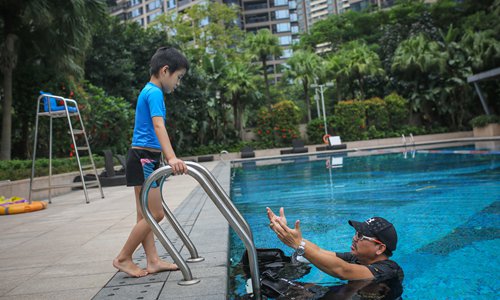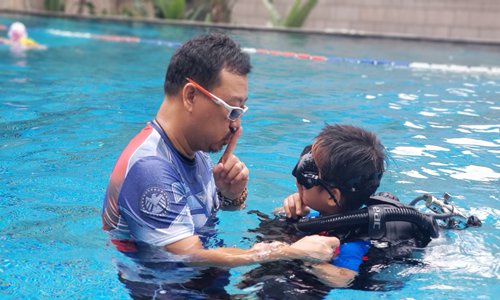
Chan Leung-bo encourages a boy to come down to the swimming pool in Guangzhou, South China's Guangdong Province on September 28, 2018. Photo: VCG
A group of special scuba divers can be seen painting, playing, doing math and writing every Tuesday and Thursday at an indoor swimming pool in Ersha Island, Guangzhou, South China's Guangdong Province.
They are part of the Diving for Humanity (DFH) program, brainchild of Chan Leung-bo, 52, former deputy chairman of the Hong Kong Underwater Association and father of two autistic children. It was launched on August 1, 2016 in Guangzhou, and aims to help autistic children to fit into normal life through scuba diving.
"Lifting their mood is the most obvious and strongest effect, because it's relatively quiet underwater, and along with the weightlessness, it makes the environment feel like a womb," Chan explained. "They feel safe there."
Students become more focused underwater, and tasks that are difficult for them on land can be accomplished more easily. It's like a leisure park for these children, providing them another window to showcase themselves, giving them confidence and connecting them with us, Chan explained.
For autistic children, bringing about a small change in their behavior takes a lot more effort than in other children. Seven years ago, Chan tried to teach his sons to adjust their breathing and control their moods through scuba diving. "When I taught them to swim, they liked the feeling of being underwater and would listen to me more," said Chan.
"At the beginning, they were too scared to wear swimming goggles, and couldn't stay in the water," Chan told the Global Times. "Once I threw their favorite Godzilla toy into the swimming pool, they put on the goggles spontaneously, jumped into the water and took the toy."
"The move yielded good results, as they are now much better at controlling their attention and mood," Chan told the Global Times.
Shum Chakwing, a co-founder of DFH, who learned scuba diving from Chan, was inspired and told Chan to spread the method to benefit more autistic children after a casual conversation on the progress Chan's two sons made from diving.
"Jogging, swimming and many other sports require power and speed, while diving requires relaxation, which helps these special children find their own universe," Chan said.
Although no research has been done on the effects of scuba diving on autism, Chan wants to help more autistic children through his experience of interacting with his autistic sons.
On the first day of the program, a student who was 1.8 meters tall cried and rolled around on the edge of a public pool because he was so scared. One man asked Chan if the student was insane.
Since then, Chan was determined to find these children a special and quiet environment.
Eventually, the Guangdong Swimming Association allowed Chan to use the pool when other classes weren't being held there.

Chan Leung-bo teaches an autistic kid scuba diving in a swimming pool. Courtesy of Chan Leung-bo
At first, the students made slow progress, as some children were volatile, and it took a long time to get them to stay calm and follow his instructions.
One boy once lost his temper and hit his mother because of a squabble and refused to apologize. "That day, I stood there for one and a half hours confronting him until he apologized to his mother," said Chan.
"The child has made a thorough change now," Chan said. "One new student didn't dare to go into the pool, so he picked toys for her, played games with her, and helped her to accomplish the task."
In addition to teaching autistic children scuba diving, Chan also talks with their families to learn more about their daily lives. "Family environment is important, since family members should work hard to instruct the children for the rest of the week after a two-hour class," Chan said. "I even give suggestions to parents on how to instruct their children on their posture, greeting people, eating and matching clothes."
One parent told Chan after her child joined DFH, "I saw a glimmer of hope when I met your team, and you brought me a beam of sunlight."
Another parent said, "As a parent, saying 'thank you' is nowhere near enough to express my heartfelt appreciation for what you've done for my child's growth."
"Things might seem bleak for most families with autistic children, but I see it as an opportunity that allows us to devote more energy and love to our families," said Chan.
Chan takes a four-hour bus trip from Hong Kong to Guangzhou every Monday and goes back to Hong Kong on Friday to spend time with his sons.
Chan video chats with his sons every day after the training. "I actually sacrifice time with my sons at home," Chan said.
Chan said that while DFH is now receiving financial help from a philanthropic foundation, support is still limited. Chan lives in his office, saying that the money he saves on rent can be used to help more children.
So far, a total of 55 children have participated in the program, which is free for most of them. Chan hopes to bring more autistic children to DFH so that he can obtain more data and this form of therapy will be more accepted by society.
"I hope the children can act as normally as possible and live a life like normal people," said Chen.
Chan hopes more philanthropic and public welfare organizations and volunteers will be able to join this program for autistic children. "A free (heated) swimming pool is also fine, so that we can help more autistic children and their families," said Chan.